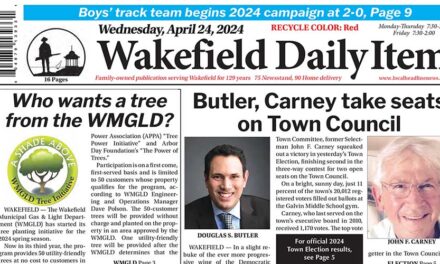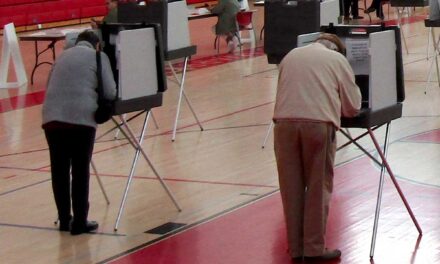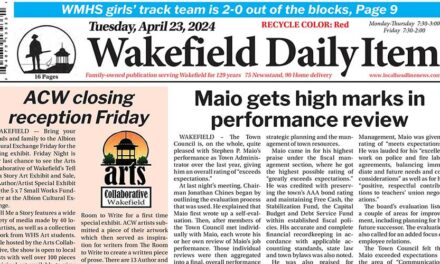This is the last of three parts.
Published in the November 2, 2018 edition.
By DAN TOMASELLO
A proposed ballot question would uphold an existing state law designed to protect transgender people in public places.
Question 3 would add, “Gender identity to the list of prohibited grounds for discrimination in places of public accommodation, resort or amusement.” A yes vote would keep the current law, which prohibits discrimination on the basis of gender identity in places of public accommodation. A no vote would repeal this provision of the public accommodation law.
According to Question 3, “a place of public accommodation, resort or amusement is defined in existing law as any place that is open to and accepts or solicits the patronage of the general public, such as hotels, stores, restaurants, theaters, sports facilities and hospitals.”
“Gender identity is defined as a person’s sincerely held gender-related identity, appearance or behavior, whether or not it is different from that traditionally associated with the person’s physiology or assigned sex at birth,” reads Question 3. “This law prohibits discrimination based on gender identity in a person’s admission to or treatment in any place of public accommodation. The law requires any such place that has separate areas for males and females, such as restrooms, to allow access to and full use of those areas consistent with a person’s gender identity.”
The law prohibits “the owner or manager of a place of public accommodation from using advertising or signage that discriminates on the basis of gender identity.”
“This law directs the state Commission Against Discrimination to adopt rules or policies and make recommendations to carry out this law,” reads Question 3. “The law also directs the state attorney general to issue regulations or guidance on referring for legal action any person who asserts gender identity for an improper purpose.”
Question 3 is the first-ever statewide referendum in the U.S. on a transgender rights law.
Freedom for All Massachusetts is the organization supporting the Yes on 3 Campaign. The organization states on its website that “transgender people should have the same basic protections as everyone else — to live their lives with safety, privacy and dignity.”
“We are urging voters to vote Yes on 3 this Election Day to uphold the state law that protects transgender people from discrimination and harassment in public places, such as restaurants, retail shops and medical offices,” said Matt Wilder, a spokesman for the Yes on 3 Campaign. “We all deserve to be treated with dignity and respect and that’s what this law does. In the two years since it was passed, there has been no increase in public safety incidents in public places, including restrooms and that is why the Massachusetts Chiefs of Police Association, the Massachusetts Major City Chiefs Association and the state’s 50 leading sexual assault prevention agencies all support upholding the law.”
North Reading resident Aldebran Longabaugh-Burg, whose son is transgender, urged residents to vote yes on Question 3.
“My son grew up in North Reading, attended our schools, and is now out of college and living in Boston,” said Longabaugh-Burg. “He gets up every day and takes a bus to work, is able to grab coffee or go to lunch with friends, and if he ever needs emergency medical care I know he cannot be turned away from a hospital because he is transgender. It was often a struggle for him and our family as he matured without these crucial protections in place. There were times he didn’t feel safe being out in public alone, unsure of how he would be treated.
“I helped fight for this law that added gender identity to the list of groups that are protected from discrimination and harassment in public spaces, and my heart sunk when I learned it would be on the ballot this November,” Longabaugh-Burg continued. “Since the law was passed in 2016, there has been no increase in public safety incidents according to law enforcement across the state. This is about dignity, respect and safety for everyone in Massachusetts. Please imagine yourself in my shoes and vote yes on Question 3 to protect my son and all other transgender people in Massachusetts on Nov. 6.”
Keep Massachusetts Safe is the organization that opposes Question 3.
“This needs to be repealed because no woman should be put in the position where her body is exposed in a way she doesn’t want or is uncomfortable with,” said Debby Dugan, chairwoman of Keep Massachusetts Safe, the organization that collected sufficient signatures to put the repeal question on the ballot.
State Rep. Marc Lombardo (R-Billerica) claims “the bill was not needed to address discrimination.”
“The Mass Commission Against Discrimination said they didn’t need this bill to protect the rights of transgender people because of the previously settled Jette v. Honey Farms case heard by the Massachusetts Supreme Judicial Court,” Lombardo said. “This bill was about gender identity and a radical left push to eliminate societal and scientific norms about gender.”
The Associated Press requested records from the state attorney general’s office and the Massachusetts Commission Against Discrimination, which turned up only a handful of complaints directly related to the two-year-old law, and none alleging predation in restrooms or locker rooms.
The Williams Institute at the UCLA School of Law recently released a study on the state law. The study concluded, “Massachusetts’ public accommodations nondiscrimination laws that include gender identity do not affect the number of frequency of criminal incidents in restrooms, locker rooms or changing rooms.”
“In addition, reports of privacy and safety violations in these places are exceedingly rare,” reads the study. “Researchers used criminal report data from several Massachusetts localities to assess differences in the rates of crime in areas with and without public accommodation laws that included gender identity protections. Results showed that immediately after the laws’ passage, there were fewer incidents of privacy and safety violations in places with gender identity inclusive public accommodation laws than in comparable areas without the laws.”
In an interview with The Boston Globe, “Vote No on 3” campaign spokeswoman Yvette Ollada declined commenting on the study. She also accused the report of being biased.
“If it’s unbiased, wouldn’t they send it to both campaigns?” Ollada said.
Freedom for All Massachusetts notes on its website that the state has “laws in place that make it illegal to harm or harass people in restrooms.”
“These laws are used to prevent assault, keep people safe and hold offenders accountable,” Freedom for All states. “Protecting transgender people from discrimination hasn’t changed that.”
The transgender law is supported by a number of Democratic officials in Massachusetts and from Republican Gov. Charlie Baker.
Wakefield Town Councilors Mehreen Butt, Ed Dombroski, Ann Santos, and Julie Smith-Galvin, State Sen. Jason Lewis, State Rep. Paul Brodeur, State Rep. Donald Wong and the Wakefield Human Rights Commission have all signed the “Yes on 3” pledge to uphold the state’s existing transgender nondiscrimination law.
—
Beacon Hill Roll Call’s Bob Katzen and The Associated Press contributed to this report.




